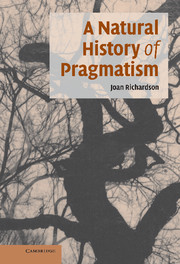Book contents
- Frontmatter
- Contents
- Preface
- List of abbreviations
- 1 Introduction: frontier instances
- 2 In Jonathan Edwards's room of the idea
- 3 Emerson's moving pictures
- 4 William James's feeling of if
- 5 Henry James's more than rational distortion
- 6 Wallace Stevens's radiant and productive atmosphere
- 7 Gertrude Stein, James's Melancthon/a
- Notes
- Bibliography
- Index
6 - Wallace Stevens's radiant and productive atmosphere
Published online by Cambridge University Press: 22 September 2009
- Frontmatter
- Contents
- Preface
- List of abbreviations
- 1 Introduction: frontier instances
- 2 In Jonathan Edwards's room of the idea
- 3 Emerson's moving pictures
- 4 William James's feeling of if
- 5 Henry James's more than rational distortion
- 6 Wallace Stevens's radiant and productive atmosphere
- 7 Gertrude Stein, James's Melancthon/a
- Notes
- Bibliography
- Index
Summary
When we go to expel body out of our thoughts, we must be sure not to leave empty space in the room of it; and when we go to expel emptiness from our thoughts we must not think to squeeze it out by anything close, hard and solid, but we must think of the same that the sleeping rocks dream of; and not till then shall we get a complete idea of nothing.
Jonathan Edwards, “Of Being”THE POET IS THE PRIEST OF THE INVISIBLE
“I desire my poem to mean as much, and as deeply, as a missal. While I am writing what appear to be trifles, I intend these trifles to be a missal for brooding-sight: for an understanding of the world.” Explicit here as elsewhere throughout his work and correspondence about the combined function of his poetry and ministerial office, Wallace Stevens was even more challenged to provide an adequate basis for belief than the earlier priests of the invisible whose heir he was. While Jonathan Edwards had to find words capable of holding together a disintegrating community, he was himself held in the strong embrace of belief in a divine order. While Emerson redefined the concept of the divine, he still believed in an order, the law of continuity he found revealed in the “ecstatic” method of nature.
- Type
- Chapter
- Information
- A Natural History of PragmatismThe Fact of Feeling from Jonathan Edwards to Gertrude Stein, pp. 179 - 231Publisher: Cambridge University PressPrint publication year: 2006



